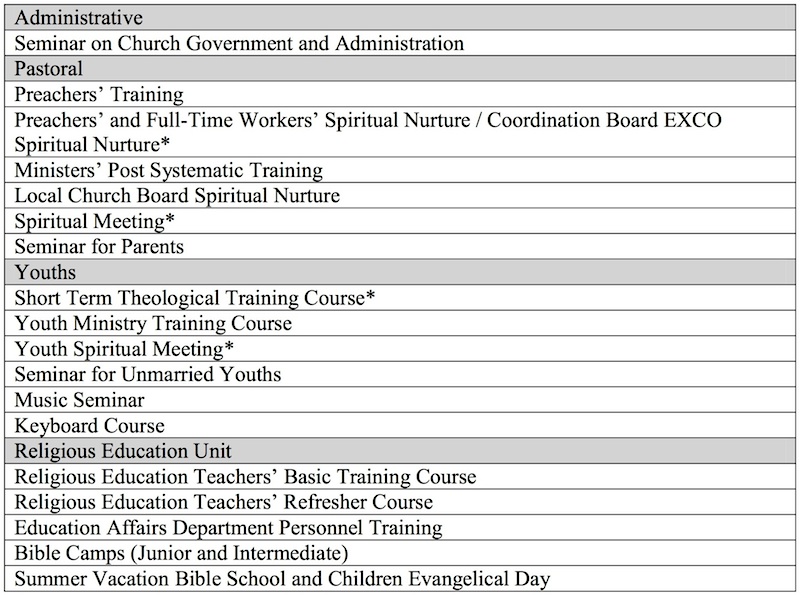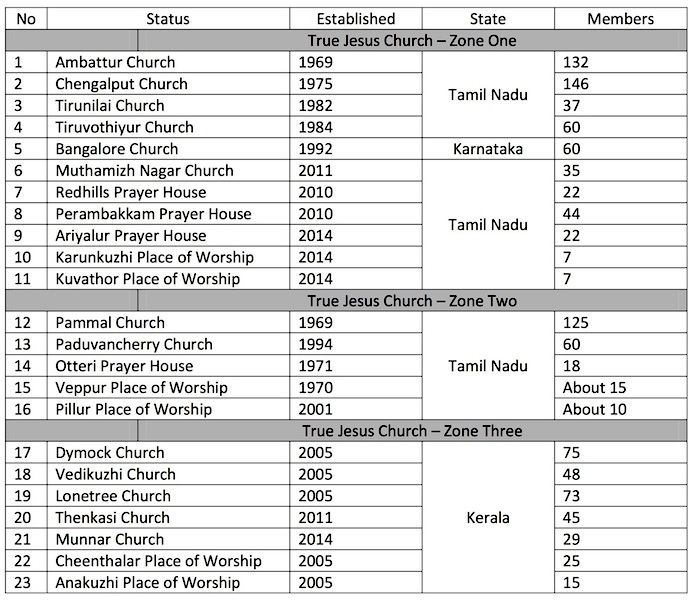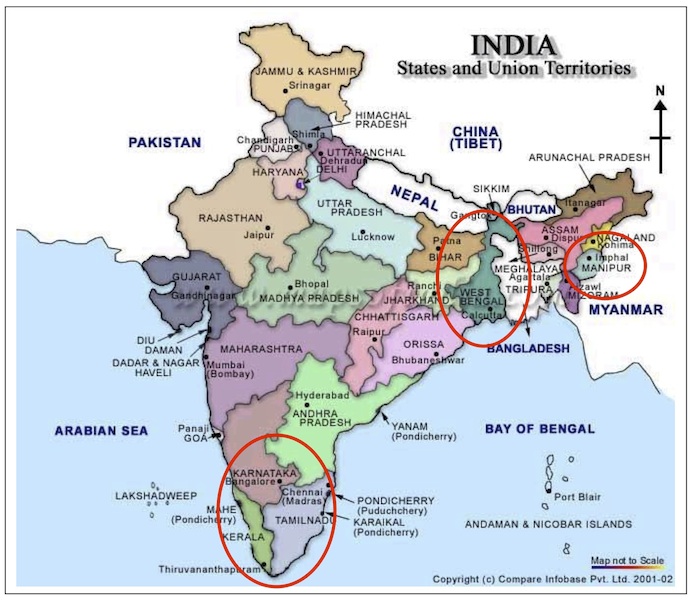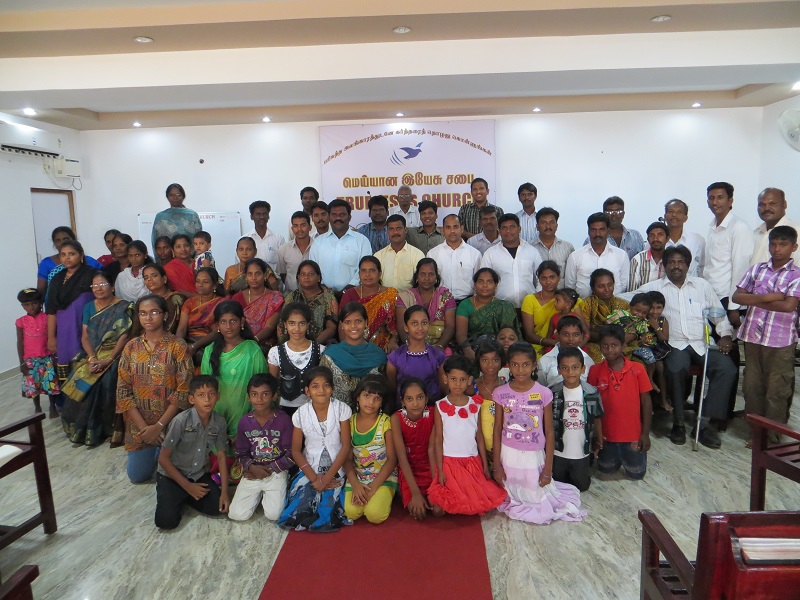India Mission Committee CURRENT STATUS True Jesus Church (TJC) in India is located in the states of Tamil Nadu, Kerala, and Karnataka in South India. Presently, there are thirteen churches, four prayer houses, and six places of worship, with a total membership of around 1110. THE MILESTONES 1980s: South East Asia Evangelical Center In order to enhance the work in India, the International Assembly tasked the South East Asia Evangelical Center (SEAEC), headquartered in Kota Kinabalu, Sabah, Malaysia, to look into church development in India. 1994: India Mission Committee In October 1994, at the 14th SEAEC councilors’ meeting, the ministry in India was entrusted to the General Assembly (GA) of Malaysia and Singapore. The India Mission Committee (IMC) was formed to manage this work and it formulated a master development plan to turn the Indian churches into “self-administering, self-propagating, and self-financing” churches. The IMC is headed by the Chairman of GA Malaysia and comprises eight other committee members, with some holding portfolios such as secretary, treasurer, pioneering in charge, and education in charge. They are appointed by the Executive Committee of GA Malaysia for a term of three years, and they hold their meetings bi-annually. Since 1996, the IMC has been making three missionary visits to India annually, in the months of January/February, April/May, and September/October. 1996: India Working Committee The India Working Committee (IWC) was set up in 1996. The committee, consisting of local representatives from the then Pammal Center and Ambatur Center, initiated and supervised the work in India, in order to reach the goal of “self-administration, self-propagation, and self-financing.” 1997: Resident Preacher Stationed in India In 1997 and 1998, the IMC stationed Malaysia GA preachers as resident preachers in India, with each preacher serving a term of around ten months. The preachers were to direct and align the IWC work with the IMC policies. Together with local ministers, they also led the pastoral and evangelistic work in India. This decision greatly enhanced the work in India. 2001: India Coordination Board In early 2000, the IMC saw the need to reorganize the churches in India. The IWC was only a working committee that implemented the IMC’s decisions. In order to progress, the churches in India needed to have its own organization. Hence, the IMC started to review and revise the India church constitution. Next, it worked with the IWC to confirm the status of the churches and prayer houses. With these done, the restructuring could take place. The year 2001 marked a new chapter in the history of the churches in India. The organization “True Jesus Church Coordination Board in India” (ICB) was formed. At its first church delegates conference, delegates from local churches were briefed on the reorganization, the constitution, and the organizational structure of the ICB. Elections for the ICB executive committee members took place. The churches under the ICB were to work towards “self-administration, self-propagation, and self-financing.” FOCUS ON TRAINING India Theological Training Center As the churches in India comprise mostly Tamilians, it is only right and apt that they preach and pastor to their own countrymen. As such, the IMC sees the importance of providing training to develop the local members. With this goal in mind, the India Theological Training Center (ITTC) was built to provide better facilities and learning environment. By the grace of God, and with the financial contributions and prayers of our brethren world-wide, the ITTC was dedicated to the Lord on September 12, 1999. This was another important milestone in the work in India. Religious Education When the IMC took over the work in India, one main focus was to set up proper religious education (RE) units within the churches. In 2001, the IMC introduced the RE system in India. It planned training courses and translated TJC’s RE handbooks and texts into local languages and distributed them to the churches. The RE system in India is now fully operational, with the formation of the National Education Affairs Council (NEAC) in 2004. The NEAC looks after the RE affairs of the children, teenagers, tertiary students, and youths, and systematically conducts RE classes. It trains teachers and conducts refresher courses. This work is done “All for Jesus and the Next Generation.” Short-Term Theological Courses The Short-Term Theological Training Course started in 1996, with the objective of imparting the pure teachings of the True Jesus Church to the participants. Through these courses, it enables the participants to: Build up their faith in the word of God and in the beliefs of the True Jesus Church. Cultivate the spiritual character of a true Christian and a life of Bible reading and of prayers. Pray for the Holy Spirit and for spiritual power and gifts. Have detailed knowledge of the gospel, and serve the Lord Jesus in their local churches. Full-time Preachers’ Training Training for full-time preachers started in 2000 with an intake of three students. They graduated and were ordained in 2002. The second preachers training course started in 2002 with four students and they graduated and were ordained in 2005. As part of the restructuring in 2002, the IMC also retired local workers[1] paid by the International Assembly (IA), replacing them with newly ordained deacons and preachers. Training Conducted in India The IMC is a strong advocate of religious training and over time, has conducted numerous courses, as listed in the table below, and those with asterisks are conducted annually.

SEEKING LOST SHEEP
True Jesus Mission The Lord is guiding the work of restoring the deviated True Jesus Mission (TJM) members, an initiative which began in 1999. The TJM was set up by a Tamilian from India who was ordained as a deacon after he had accepted the truth in Ipoh, Malaya, in 1930. He brought the gospel to India in 1932 but, because of World War II, the church lost contact with the Malaya churches. This group of believers also attempted to contact our churches in China, but they were unsuccessful due to the border war between China and India. Without grounding in the truth, over time, some of their teachings changed. They did not have any communication with the TJC until 1999 when one of their members happened to pass by the True Jesus Church in Pammal and made contact. Up to now, five churches with the total membership of around three to four hundred have returned to the fold. Praise the Lord. REACHING OUT Evangelism and Pioneering With assistance from the Eastern Hemisphere Voluntary Members Team (EHVMT), the IMC established contact with the Chinese community (mainly of the Hakka dialect) in the cities of Chennai and Kolkata in 2006. The IMC is presently evangelizing to them. Also in 2006, the IMC started pioneering work in the states of West Bengal and Manipur in North East India, evangelizing to the Bengalis, the largest ethnic group in the state of West Bengal, and the locals, some of whom were pastors from other denominations. In the near future, the IMC hopes to reach out to the cities of Mumbai and Delhi where some of our members work and reside. CURRENT CHALLENGES Leadership Issues The ICB has yet to be able to garner strong support from the local churches. Development of the local churches also depends on the quality of local workers. As such, the pace of growth of each church is different: some churches are developing well but others are not. Pastoral work in India is also constrained by differences between preachers and ministers, limitations in the system of sending workers, and weak pulpit ministry. Our church in India is in serious need of workers with good spiritual quality and foresight. This absence has hindered church growth, as local members do not receive adequate spiritual nourishment, and they neither support nor respect existing stewards. Over the years, the IMC has invested much effort in cultivating and training a new generation of spiritual leaders. This work will continue. Financial Issues Financial support from the local churches to the ICB is lacking. Local churches are able to support their own divine work, but the ICB faces financial difficulties. The IMC will continue to strengthen the local churches’ offerings and members’ contribution to the ICB. Evangelism and Pioneering in North-East India The IMC has invested much effort and money in India’s pioneering work. However, as there is no permanent local presence of the IMC personnel, evangelistic work in India remains at its infancy. Many truth-seekers have come and gone; only a few are still in contact with the church. The IMC will utilize more volunteers for this work. 
CONCLUSION
The IMC looks forward to see the churches in India turning into “self-administering, self-propagating, and self-financing” churches. It continues to pray that there will be “Two Generations Working Together” and that efforts invested by the workers are “All for Jesus and the Next Generation.” 
Churches in India

Churches in South India: States of Tamil Nadu, Kerala and Karnataka Pioneering in North East India: States of West Bengal and Manipur
[1] When the IMC took over the work, India had seven IA paid workers.
| 

